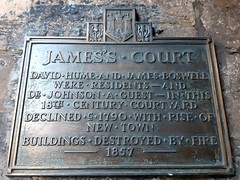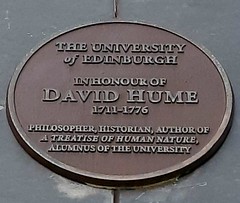David Hume


David Hume
(1711-1776)
Commemorated on 4 plaques
Riddell's Close and Court in this close lived David Hume before settling in James's Court. In Court beyond Baillie Macmorran banqueted in his house James VI, his queen and Danish nobles
Riddle's Court, 322 Lawnmarket, EH1 2PG, Edinburgh, United Kingdom where they lived (1750)
In a house on this site David Hume lived 1771 - 1776
21 South St David Street, EH2 2BW, Edinburgh, United Kingdom where they lived (1770-1775)
James's Court. David Hume and James Boswell were residents - and Dr Johnson a guest - in this 18th century courtyard. Declined c.1790 with rise of New Town. Buildings destroyed by fire 1857.
James's Court, Edinburgh, United Kingdom where they lived
In honour of David Hume 1711-1776. Philosopher, historian, author of A Treatise of Human Nature, alumnus of the University.
David Hume Tower, George Square, Edinburgh, United Kingdom where they worked




